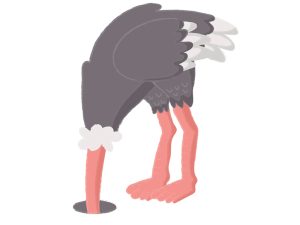A Taxonomy of Climate Deniers

Image: rawpixel.com/Freepik
A groundbreaking new study of climate deniers had led to fascinating results, showing a more complex picture than scientists had previously thought. Prof IM Smart of the Madeup Institute, who led this very science-y scientific study in the name of Science spoke to Mark Engineer about his findings.
“Climate deniers as a species only evolved relatively recently,” explains Professor Smart. “This, plus the fact that they’re hard to spot, often preferring to hide in the Internet, means that studies of their habits have so far been limited. As far as we at the Madeup Institute are aware, ours is the first serious attempt to taxonomise the species.”
Smart and his team discovered three distinct subspecies of climate deniers, each with its own habits and preferred habitats:
1 Climatus Denialus Flaturthus (The Flat-out Denier.)
These are the ones who say that it just isn’t happening. That the Earth isn’t getting any warmer. That polar bears have never had it better. In fact there’s footage of them having wild, icy polar bear parties, and that the only reason most of us haven’t seen it is that it’s being suppressed by the Big Green Woke Conspiracy, a shadowy worldwide cabal led by Greta Thunberg, David Attenborough and Naomi Klein and bankrolled by George Soros, with dastardly plans to give us all clean air and water, force feed us lentils three times a day, and replace all our nice oily cars with those horrid electric ones, which actually run on the tears of unicorns, and break down if you question how they self-identify.
While it may be easy to mock them, Smart warns against taking them too lightly. “A while ago we’d have described Flaturthus as relatively harmless cranks, lurking in the holes and corners of the Internet and occasionally on the fringes of the Republican party. However, recent changes in the political climate have led to increasingly favourable conditions for them to proliferate in ‘real life’.”
Smart advises approaching with care. “Engaging with them online only serves to raise their profile, which is counterproductive. In real life, they can become aggressive if their worldview is challenged, or at least stick their fingers in their ears and go lalalalala not listening.”
2 Climatus Denialus Disingenuous (‘The Sceptic’)
These are the ones who don’t deny that the planet is heating up, but say it’s nothing to do with us. Who say the Earth has always warmed and cooled, conveniently ignoring the fact that there’s never been such a rapid spike in warming as we’ve had since we started burning fossil fuels. Or that there still isn’t a proven correlation between our actions and warming, despite at least 97% of climate scientists saying there is.
Smart says, “We originally planned to name this subspecies Deniaulus Scepticus, but we decided against it. They’re usually referred to as climate sceptics, which is no doubt how they like it. The word sceptic implies a healthy distrust of a phenomenon, based on compelling evidence to the contrary. These people don’t have that, though they can be good at sounding like they do when they make their arguments about the changing tilt of the Earth, or the sun burning hotter, or increased CO2 being a good thing because it leads to more trees. They’re often spotted using Latin phrases like ad hominem and tabula rasa to try and make themselves sound reasonable and clever.
“If you plan to approach one, go ahead, as it’s important to call them out. But be prepared. Their arguments can be fairly sophisticated. They tend to have done their homework, and just because the textbooks are nonsense that doesn’t make them necessarily straightforward to refute.”
3 Climatus Denialus Enabulus (‘The Enabler’)
What makes them most dangerous is that many can now be found in positions of prominence within the ranks of even supposedly progressive political parties and important organisations. This, Smart says, makes them perhaps the most dangerous deniers of all. “They’ll almost always cite the economy, and the impossibility of progress without constant growth. Often, they’ll show misplaced faith in magical thinking, saying the problems will be solved with yet-to-be-discovered technologies like wide-scale carbon capture or nuclear fusion, while ignoring the fact that the technological solutions to tackle the crisis already exist, and can be deployed at scale.
“The classic Enabler likes to present itself as the grown-up in the room. It paints its opponents as naïve, as if it’s naïve to point out that it’s absurd to place the manmade laws of ‘the markets’ above the actual laws of actual physics, or that using one’s living room as a toilet and rubbish dump is unwise.
“What makes them most dangerous is that many can now be found within the ranks of even supposedly progressive political parties. Although their worldview is fairly easy to refute – after all, a child can point out that unlimited growth on a planet with limited resources is impossible – the idea of the growth economy is so entrenched in our thinking that the vast majority of us, including most respected economists and journalists, seem unable to call it out.”
The solution, says Smart, is to band together. “As they’re often in positions of power and influence, it’s easy for them to ignore lone voices. Ironically though, their positions make them vulnerable to larger groups. If enough of us get together and give them the proof that they’re talking rubbish, it becomes impossible for them to deny it anymore.”




0 Comments